Recommended Reading
The Christian Leader at Work: Serving by Leading includes a complete bibliography of secular and religious sources used in the book. Here are some of my favorite books that discuss servant leadership in a Christian context.

Baron, Tony. The Cross and the Towel: Leading to a Higher Calling. Tucson, AZ: Wheatmark, 2011.
Dr. Tony Baron holds a double doctorate in psychology and theology, and is an ordained Anglican priest. I especially appreciate Chapter 6, “The Measuring of Jesus’s Leadership: Moving from Self to Saint,” and Chapter 9, “Becoming a Servant Leader.”

Bell, Skip, ed. Servants & Friends: A Biblical Theology of Leadership. Berrien Springs, MI: Andrews University Press, 2014.
This books features chapters by twenty authors, most of whom are connected with the Seventh-Day Adventist Theological Seminary at Andrews University. Chapters are short, and include questions for reflection as well as endnotes. I recommend Chapter 13, “Nehemiah: The Servant Leader” by Barry Gane, and Chapter 15, “Jesus and Leadership,” by R. Clifford Jones.
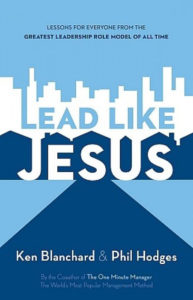
Blanchard, Ken, and Phil Hodges. Lead Like Jesus: Lessons from the Greatest Leadership Role Model of All Time. Nashville, TN: W Publishing Group,
Blanchard and Hodges have strong backgrounds in management and leadership. Their book focuses on the characteristics of servant-leaders—heart, head, hands, and habits. I especially appreciate the way they address ego issues (EGO can mean “edging God out,” but can also mean “exalting God only”). This is a very quotable book—there are so many excellent, succinct observations. Blanchard and Hodges founded the national Lead Like Jesus organization that provides publications and workshops.

Boers, Arthur. Servants and Fools: A Biblical Theology of Leadership. Nashville, TN: Abingdon Press, 2015.
Boers steps back and challenges the modern fascination with leadership. He notes that throughout the Bible, there is a struggle between God’s leadership and the world’s leadership. Leaders in the Old Testament were flawed, and many are described in the Bible as evil. That’s why Jesus pointed us in a different direction—to lead not as kings but as servants.

Erwin, Gayle. The Jesus Style. Palm Springs, CA: Ronald N. Haynes Publishers, Inc., 1983.
Erwin is folksy, even funny. His chapter on “The Jesus Approach,” describing Jesus’s background, made me smile. However, Erwin has a serious message. He explains how Jesus was nonthreatening and nonmanipulative so that we could freely choose to follow him. Erwin describes servanthood as “a loving choice we make to minister to others.”

Foster, Richard. Money, Sex and Power. London: Hodder & Stoughton, 2009.
Foster is a Christian theologian and author in the Quaker tradition. I especially appreciate Part III of his book, the part on power. He notes that “power can be an extremely destructive thing in any context, but in the service of religion it is downright diabolical. Religious power can destroy in a way that no other power can.” However, there is also spiritual power, the kind of power that “creates life and joy and peace” because it proceeds from God. Foster encourages us to use power for the good of others. He calls his readers to the “ministry of power” which functions through the ministry of the towel and the vow of service.

Gunderson, Denny. The Leadership Paradox: A Challenge to Servant Leadership in a Power-Hungry World. Seattle: YWAM Publishing, 2006.
Denny Gunderson is a practicing psychotherapist and pastor who served as a leader in Youth With A Mission. He has some very pertinent chapters on “The Control Trap” and “The Siren Call of Stardom.” Portions of his book are like a prose poem. Gunderson begins his chapters with stories about characters who actually see and interact with Jesus in person. The stories give immediacy and a sense of reality to the themes in the book.
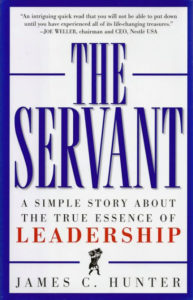
Hunter, James C. The Servant: A Simple Story about the True Essence of Leadership. Rocklin, CA: Prima Publishing, 1998.
This is a popular book, presented in a story format. A businessman whose outwardly successful life is falling apart reluctantly attends a weeklong leadership retreat at a remote Benedictine monastery where he learns the basic principles of servant leadership. Hunter uses Corinthians 13 as the basis for defining servant leadership.
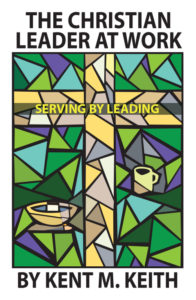
Keith, Kent M. The Christian Leader at Work: Serving by Leading. Honolulu, HI: Terrace Press, 2015.
I wrote this book for Christian leaders, whether they are leaders in churches, businesses, non-profit organizations, the military, government agencies, schools, or hospitals. Beginning with the importance of faith, the commandment to love, and the call to serve, the book describes the service model of leadership, key practices of servant-leaders, and organizational structures that are based on the teachings of Jesus and the guidance of Scripture. It addresses practical leadership issues such as motivation, leading change, and how to be effective as a leader who is in the world, not of the world. My goal in writing the book was to combine the wisdom of the Scriptures with empirical research and experience that support Biblical teachings. The book includes a Study Guide for individual reflection or group discussion.

Kraybill, Donald B. The Upside-Down Kingdom. Scottdale, PA: Herald Press, 2003.
I highly recommend this book. It is a well-reasoned, bold call to radical discipleship. It will make you sit up and pay attention to what Jesus actually said and what his teachings mean today. Dr. Kraybill has a Ph.D. in sociology and has served as a pastor as well as a leader with Mennonite and Church of the Brethren organizations. I especially appreciate Chapter 11, “Low Is High,” regarding Jesus’s teachings against hierarchy. The book was originally published in 1978, and was completely revised for the twenty-fifth anniversary edition in 2003.

Malphurs, Aubrey. Being Leaders: The Nature of Authentic Christian Leadership. Grand Rapids, MI: Baker Books, 2003.
Aubrey Malphurs is Senior Professor of Educational Ministries and Leadership and Pastoral Ministry at Dallas Theological Seminary. I recommend Chapter 1, “A Christian Leader,” and Chapter 2, “A Servant Leader.” Malphurs says that servant leadership is “the humble service of others based on our love for them.”
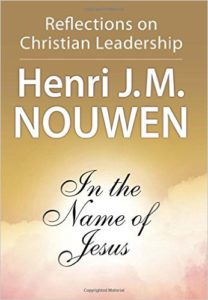
Nouwen, Henri J. M. In the Name of Jesus: Reflections on Christian Leadership. New York: The Crossroad Publishing Company, 1989.
Henri Nouwen, a Catholic priest, was one of the most influential spiritual leaders of the twentieth century. This short, much-loved book emphasizes leadership in the context of community. I especially appreciate Chapter III, “From Leading to Being Led,” with his critique of the temptation to use power as an instrument for proclaiming the gospel. “We have been tempted to replace love with power,” he said. He speculated that power is tempting because it is “easier to control people than to love people.” He concluded that “much Christian leadership is exercised by people who do not know how to develop healthy, intimate relationships and have opted for power and control instead.”
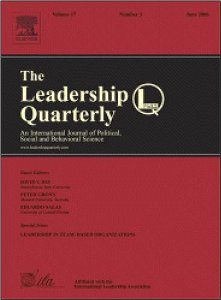
Reave, Laura. “Spiritual Values and Practices Related to Leadership Effectiveness.” The Leadership Quarterly 16 (2005): 655-687.
Reave reviewed more than 150 leadership studies and found consistency between spiritual values and effective leadership. She concluded that “the spiritual values of integrity, honesty, and humility, and the spiritual practices of treating others with respect and fairness, expressing caring and concern, listening responsively, appreciating others, and taking time for personal reflection have all been linked to quantifiable positive effects for organizations and individuals.” I especially appreciate her findings regarding humility. She concluded that “in spite of all the fascination with charismatic personalities, it turns out that quiet, humble leaders who stay in the background are often the most effective.”
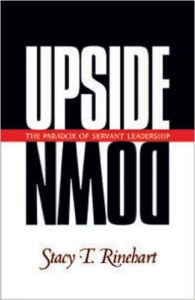
Rinehart, Stacy T. Upside Down: The Paradox of Servant Leadership. Colorado Springs, CO: NavPress Publishing Group, 1998.
Dr. Rinehart does a good job of critiquing the power model of leadership and explaining servant leadership. I often quote his statements about teams, especially the concept of “rotating functional leadership” among team members. Rinehart has specialized in recruiting and building high-capacity teams. For example, back in the 1990s, he led a team that trained over 1800 missionaries who were sent to the former Soviet Union.

Sims, Bennett J. Servanthood: Leadership for the Third Millennium. Eugene, OR: Wipf and Stock Publishers, 2005.
Bennett Sims was Bishop of the Episcopal Diocese of Atlanta and founder of the Institute for Servant Leadership in Hendersonville, North Carolina. What I like about this book is that Bishop Sims applies his theology to issues we face in daily life. His topics include servanthood in conflict, sexual ethics, work and business, science, and nonviolence. Bishop Sims said that “servanthood is the path of greatness in marriage, in the marketplace, in government, and at General Motors. Jesus reveals a way of life, not simply a way of being religious.”
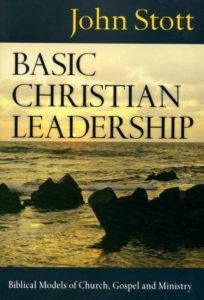
Stott, John. Basic Christian Leadership. Downers Grove, IL: InterVarsity Press, 2002.
John Stott was a British preacher and evangelist whose books have sold millions of copies. He was one of the principal authors of the Lausanne Covenant in 1974. My favorite parts of this book are Chapter Five, “Models of Ministry,” which emphasizes humility, and his Conclusion: “Our model of leadership is often shaped more by culture than by Christ. Yet many cultural models of leadership are incompatible with the servant imagery taught and exhibited by the Lord Jesus.”

Swindoll, Charles R. Improving Your Serve. Nashville, TN: Thomas Nelson, 1981.
Charles Swindoll is an evangelical pastor, author, educator, and radio preacher. He founded Insight for Living, headquartered in Plano, Texas, which airs a radio program of the same name on more than 2,000 stations around the world in 15 languages. In Chapters 7 and 8 in this book, Swindoll uses the Beatitudes to describe servant-leaders. In Chapter 12 he discusses “The Dark Side of Serving,” including persecution and rejection: “Let’s keep our eyes wide open when we grab the towel to do a little one-on-one foot washing. Every once in a while we are going to get kicked.”

Tan, Siang-Yang. Full Service: Moving from Self-Serve Christianity to Total Servanthood. Grand Rapids, MI: Baker Books, 2006.
Siang-Yang Tan is a professor of psychology at Fuller Theological Seminary and senior pastor of First Evangelical Church Glendale in California. Tan says that “serving our best friend Jesus is what true servanthood is all about.” He distinguishes between servanthood and servitude. His topics include servanthood and suffering, humility, rest, warfare, the church, the home, the workplace, and school. Tan concludes that “ultimately, servanthood is about living for eternity… We no longer live by the world’s values, such as the idols of money, sex or pleasure, and power, but by eternal values, focusing especially on love or the currency of heaven, and the eternal destinies of human lives.”

Wallis, Jim. Faith Works: How to Live Your Beliefs and Ignite Positive Social Change. New York: Random House, 2000.
Jim Wallis is a Christian writer, political activist, and founder and editor of Sojourners magazine. He reminds his listeners and readers that “faith without works is dead” (Jas 2:26). In this book he urges his readers to engage the world, focus on values instead of old labels, find allies and search for common ground, be a peacemaker and a contemplative, keep it human, and have a dream. I especially appreciate his concern for the poor, a major theme in the Bible, with thousands of verses devoted to issues of wealth and poverty.

Warren, Rick. The Purpose Driven Life. Grand Rapids, MI: Zondervan, 2002.
Rick Warren is an American evangelical Christian pastor and author. He is the founder and senior pastor of Saddleback Church, an evangelical megachurch in Lake Forest, California, and author of many Christian books. The Purpose Driven Life has sold more than 30 million copies. Fortunately, the book includes two excellent chapters on servanthood and servant leadership. Day 33 is titled “How Real Servants Act” and Day 34 is titled “Thinking Like a Servant.” Warren reminds us that we are not saved by service, we are saved for service.

Wilkes, C. Gene. Jesus on Leadership. Carol Stream, IL: Tyndall House Publishers, Inc., 1998.
Gene Wilkes is the pastor of Legacy Church in Plano, Texas, where he has served since 1987. Wilkes offers seven principles to lead as Jesus led: humble your heart, first be a follower, find greatness in service, take risks, take up the towel, share responsibility and authority, and build a team. His chapter on building a team is especially useful.
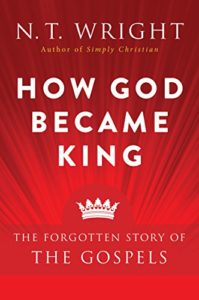
Wright, N.T. How God Became King: The Forgotten Story of the Gospels. New York: HarperOne, 2012.
N. T. Wright is a highly respected British New Testament scholar. He served as an Anglican bishop and is now Professor of New Testament and Early Christianity at St Mary’s College in the University of St Andrews in Scotland. In this book, Wright argues that servanthood is at the center of Christ’s vision of the kingdom of God.

Youssef, Michael. The Leadership Style of Jesus. Eugene, OR: Harvest House Publishers, 2013.
Dr. Michael Youssef was born in Egypt and lived in Lebanon and Australia before becoming an American citizen. He holds degrees from Moore College in Sydney, Australia, and Fuller Theological Seminary in California, with a Ph.D. in social anthropology from Emory University. What I like best about his book is his explanation of what it means to be a Good Shepherd (pages 42-43). Youssef grew up in the Middle East, and observed shepherds and sheep first-hand. He says: “When Jesus claims to be the Good Shepherd, he is not using an empty metaphor. He is claiming to be a very special kind of leader—a leader who truly loves the flock and sacrifices himself for their benefit.”
